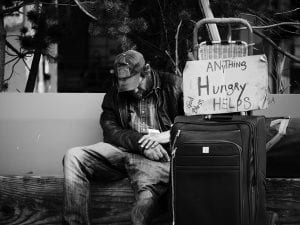Plaintiffs prevail in homeless camping case.
Pamela Hawkes, now of Spokane, Washington, who was homeless for a period of time, was cited for camping on the streets a dozen times in 2006 and 2007 – including times when there was no available shelter space available for her to take refuge.
“Even though we did our best to stay hidden and out of view, we were still being found,” Hawkes said. She is one of six plaintiffs in a lawsuit challenging local police enforcement codes against ‘homeless camping.’ A ruling by the United States Court of Appeals for the Ninth Circuit, in San Francisco, struck down the laws against homeless camping in 2018, citing the Constitution in indicating it “does not allow cities to prosecute people for sleeping outdoors if there is no shelter available.” In the lawsuit, the plaintiffs contend that “aggressive enforcement…made it illegal for them to sleep because the city did not provide alternative shelter where they could stay.” The Supreme Court has declined to hear the case.
The judgment, which in part cited the Cruel and Unusual Punishments Clause of the Eighth Amendment, concluded, “For the foregoing reasons, we AFFIRM the judgment of the district court as to the plaintiffs’ requests for retrospective relief, except as such claims relate to Hawkes’s July 2007 citation under the Camping Ordinance and Martin’s April 2009 citation under the Disorderly Conduct Ordinance. We REVERSE and REMAND with respect to the plaintiffs’ requests for prospective relief, both declaratory and injunctive, and to the plaintiffs’ claims for retrospective relief insofar as they relate to Hawkes’ July 2007 citation or Martin’s April 2009 citation.”

The plaintiffs in the case have followed different paths in and out of homelessness over the years:
“Robert Martin could not stay in any of the shelters in Boise in 2009,” according to his attorneys, “So, he slept in the bushes near Interstate 84, near a shelter where his wife and son were sleeping. He was cited for camping….Mr. Martin is now living out of a vehicle in northern Idaho and working dishwashing jobs.”
Howard Belodoff, a lawyer who has worked on behalf of the plaintiffs, added, “Lawrence Lee Smith had become chronically homeless after a career in construction…On one occasion, Mr. Smith lost the vehicle he had been sleeping in, along with his belongings.”
Robert Anderson had been staying at the Boise Rescue Mission but had to leave because of a rule at the shelter limiting how long he could remain without enrolling in religious programming.
Basil E. Humphrey was forced onto the streets after he was kicked out of a program at the Boise Rescue Mission. Belodoff said the attorneys “lost contact with Mr. Humphrey in recent years.”
“Janet F. Bell has disability and mental health issues that have made it impossible for her to work,” Belodoff said, but she now “receives Social Security support and has qualified for city-supported housing in Boise.” He added, “They are just ordinary people who just found themselves in that situation and were willing to step forward.”
“I think it’s finally time that cities start focusing on the topic of homelessness as a whole and not halfway,” Hawkes said.
Sources:
Punished for Sleeping on the Streets, They Prevailed in Court
Appeal from the United States District Court for the District of Idaho
How a federal court ruling on Boise’s homeless camping ban has rippled across the West


Join the conversation!